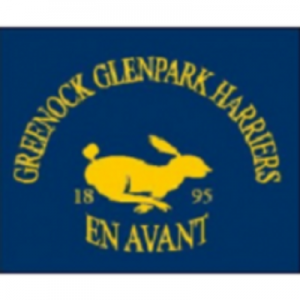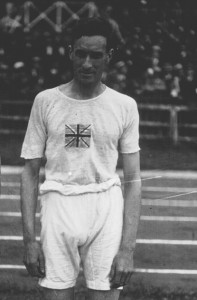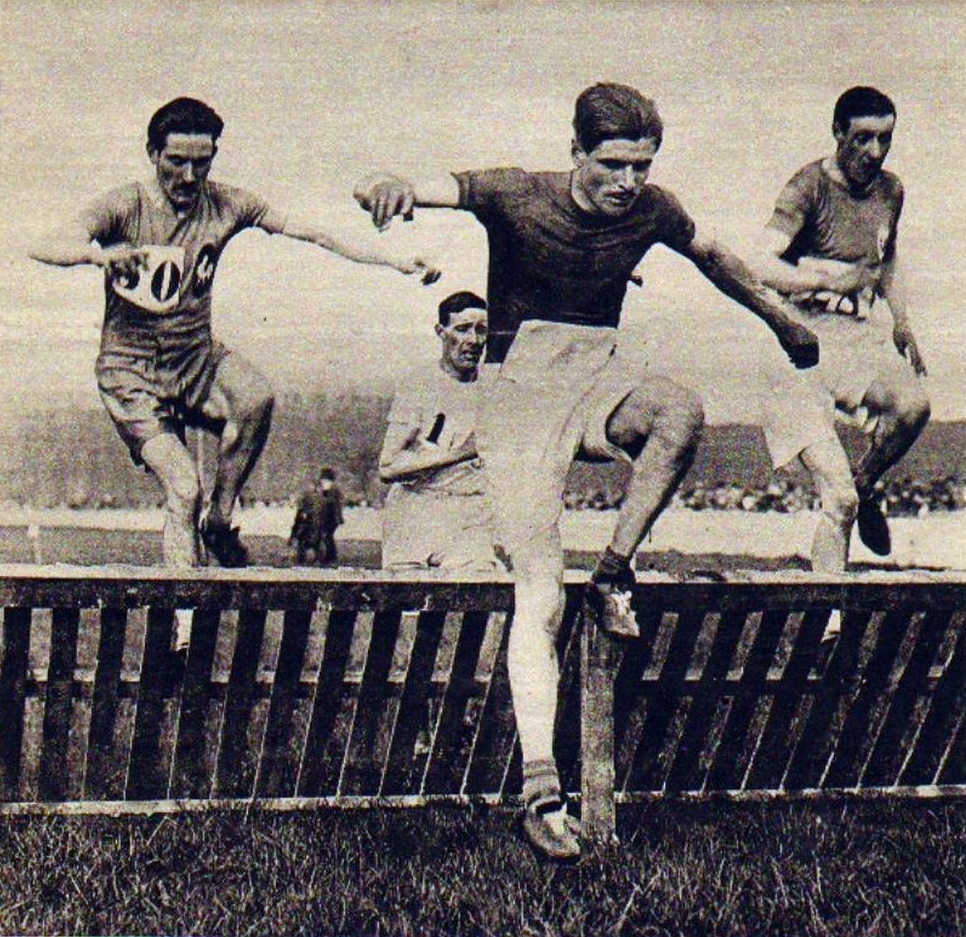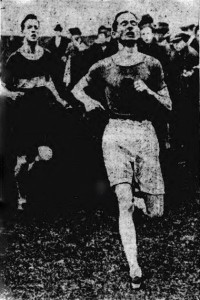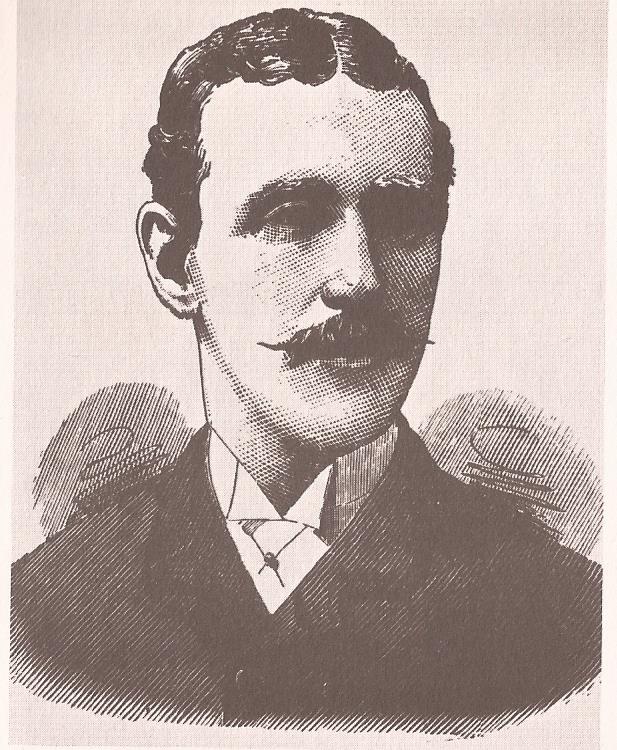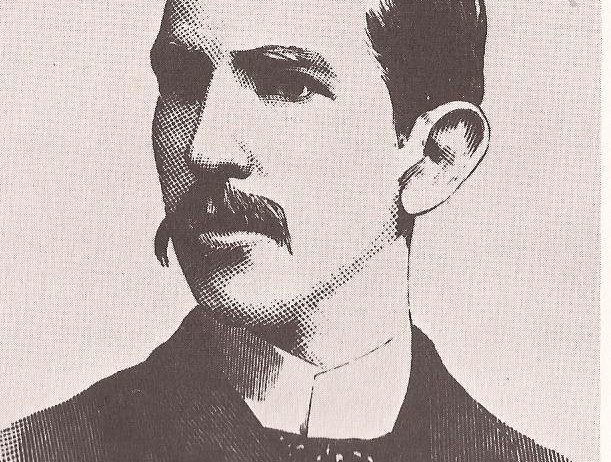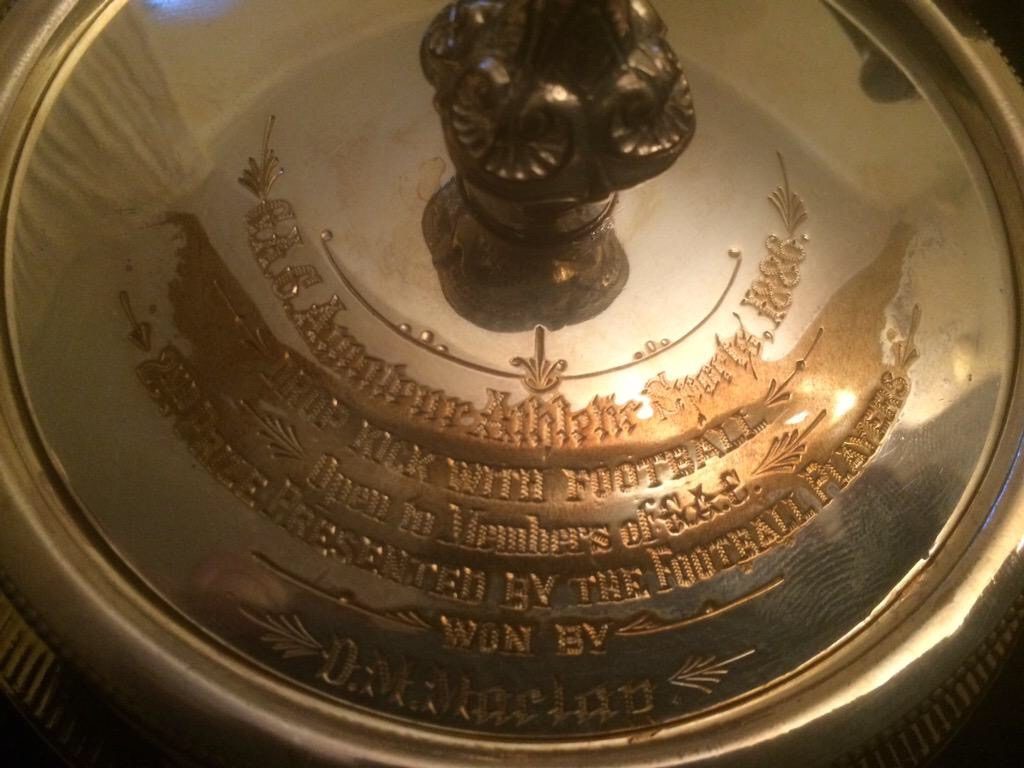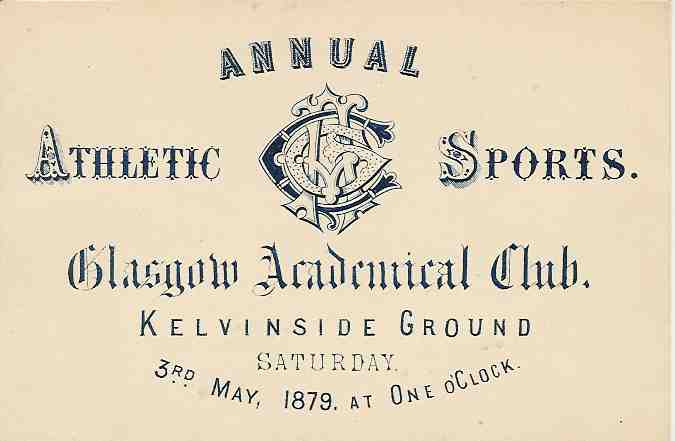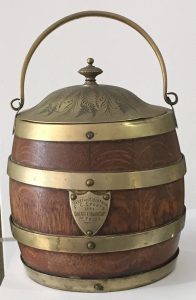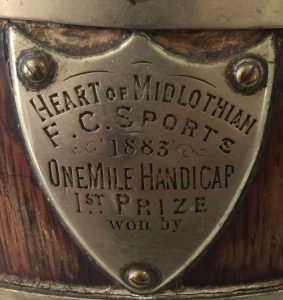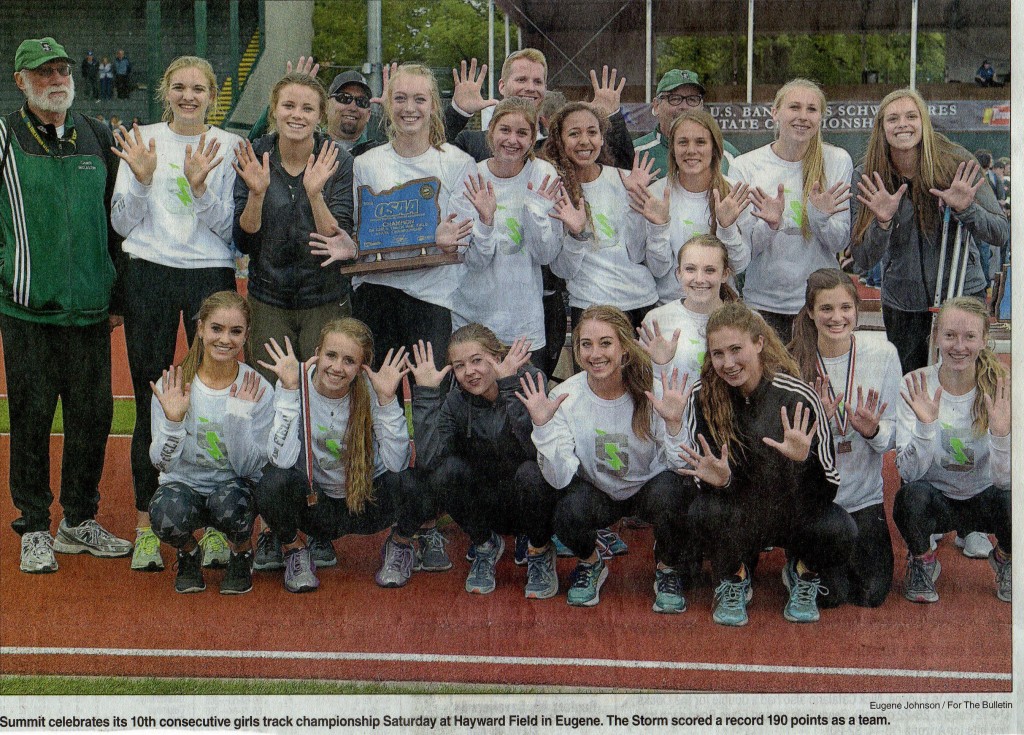The Greenock Glenpark Harriers Sports was one of Scottish athletics most respected, best supported and longest running meetings in the country. It attracted not only club runners from all over Scotland but also international athletes, including Olympians and world record holders, from many countries outside Scotland. Although a variety of clubs held sports meetings on the same day, none of them lasted for any length of time; the only meeting that lasted for any length of time on the same date as the Greenock meeting was the professional meeting organised by Clyde FC at Shawfield which began in 1913. This web page deals with the GGH sports for the years between 1920 and 1929.
Held on 31st July, 1920, the ‘Glasgow Herald’ reported on the sports as follows. “The annual English invasion began at Greenock on Saturday when the names of no fewer than nine distinguished athletes from south of the Border appeared on the programme of the Glenpark Harriers Sports. They were not all present and those of them who did compete were by no means impressive. The most successful of the visitors was CE Blewitt, the Four Miles champion, who with a start of 20 yards finished second in the one mile handicap. RA Lindsay qualified for the final of the one lap race but the winner turned up in a local man, W Wallace, who also won the 220 yards, in which the Blackheath Harrier was unplaced in his heat. Another double winner was JG McIntyre who secured the mile and the half-mile. As at Saltcoats the previous Saturday, the most interesting personality on the track was James Wilson, the Scottish distance champion, who seems to improve with each successive appearance. In the Three Miles he started from scratch with Blewitt in attendance, the Englishman following him closely for about a mile, when Wilson’s superior speed told on his companion. Wilson had another strong opponent in W Kerr, West of Scotland Harriers, but he too was eventually shaken off and the champion literally won as he liked. On May 29th, Wilson was unable to do 15 min 52.2 sec, and three weeks later he was beaten in 15 min 7.4 sec, while on Saturday he won in 14 min 49 sec with no necessity for a fast finish. These figures illustrate how Wilson has come on since the beginning of the season, and they encourage the hope that he will give a good account of himself in the Olympic Games. At Antwerp he will compete in the 6000 metres and 10000 metres races, as well as in the cross-country championships. He should be equally suited at both distances, and in the cross-country also he has a good chance of being in among the prize winners.”
The meeting was held at Cappielow Park and there were about 10000 spectators in attendance in fine weather and the times were generally good. In the almost obligatory five-a-side football tournament, Morton won 2 – 0 against Ayr United.
James Wilson
If 1920 was a good meeting, 1921 was virtually a disaster. The report on the meeting makes depressing reading about the sports held in the rain, with a ‘breeze’ and before a crowd o only 2000.
Glenpark’s Misfortune
Few places in Scotland escaped the rain on Saturday, and it is hardly necessary to say that Greenock was not one of them. The Glenpark Harriers, who have hitherto almost invariably enjoyed good weather for their sports, were badly hit financially, the attendance being less than half what it would have been had the elements permitted. They had an attractive programme and an entry list comprising all the eligible Scottish champions – that is to say, all for whom opportunities to compete were provided – and had the weather been fine it is safe to say that the capacity of the ground would have been taxed to its utmost. As it was there were only a few hundreds on the open terracing, but the stand was filled. The ground was sodden, and the combination of heavy rain, an east wind, and a holding track, seriously affected some of the competitors and accounted for the slow times returned. Duncan McPhee, for example, found the conditions so unfavourable thatin the 1000 yards invitation handicap, the only event in which he competed, he could get no nearer the tape than 20 yards in 2 min 31 sec, while JG McIntyre, the four miles champion, was actually in arrears in the two miles though he had a start of 35 yards.
Times in the sprint, which was run against the breeze, were slow, the best recorded being 10 4-5th sec, which was also the time of the final. Another feature of the meeting was the non-success of the champions. GT Stevenson, the quarter-miler, was second in the furlong. EH Liddell, the sprint champion, had nothing to show for a strenuous afternoon’s work: he was third in the 100 yards invitation handicap, but trhere were only two prizes. WA Hill won his heat in the open 100 yards handicap, but did not reach the final. Kenneth Smith, the high jump champion, was unable to concede the starts asked, and did not compete in the pole vault, at which also he won the championship in June last. RA Lindsay, the ex-Scottish champion, ran in the 300 yards invitation handicap without success. There was an entry of six teams for the relay race but in view of the depressing circumstances, the event was abandoned. As the afternoon advanced, some of the competitors became disinclined to turn out. The 300 yards invitation handicap, for example, had an entry of 16 and was intended to be run as two heats and a final. When the heats were called, only seven responded and no final was needed. Again, in the 220 yards a single runner turned out for the third heat, and in the pole vault a total of two competed for the two prizes. It would be unfair to censure those who called off, for competition in such circumstances was more heroic than pleasurable. The drawings will not cover the expenses of the meeting, and with a view to making up the deficiency the club propose to hold an evening meeting next week.”
In the five-a-side final, Morton beat Rangers by one corner to nil. There was no report in the papers the following week of a supplementary meeting the next week. That doesn’t mean that none took place – it was probably that only local athletes would take part. Such athletes as Eric Liddell, Lindsay and the rest would have found midweek travel difficult at that time. It says a lot for the Committee however that they had managed to put together such an attractive programme in the first place.
JG McIntyre
1922 was a bit better though. The weather in the morning was threatening, but it cleared up and there were just over 5000 spectators at Cappielow to see the meeting. “Greenock Glenpark Harriers scored another success with their sports meeting at Cappielow Park on Saturday. No records were made, but competition reached a high level, particularly in the 100 yards handicap, in which even time was returned in both semi-finals and then again in the final. The runners had the advantage of he wind but even so, the performances of Liddell and Gardner were very meritorious, as the breeze was, though favourable, not materially helpful. The outstanding feature of the meeting was the two miles walk in which Colin McLellan, the Scottish champion, was matched against Robert Bridge, ex-champion of England. It was understood that the latter had designs on the Scottish record. He did not come near the long-standing figures of EJ Webb, who at Ibrox Park in 1909 completed the distance in 13 min 57 1-5th sec, but he gave a fine exposition of the walking art and left the Scottish champion far behind. The absence of Duncan McPhee from the half-mile was a disappointment to many of the spectators. The champion reserved himself for the 1000 yards in which he was unable to get a place, retiring 40 yards from the tape when he realised that further effort was hopeless. EH Liddell also disappointed, standing down from the 300 yards invitation and the open furlong. He won his heat and semi-final in the 100 yards but was beaten in the final by PR Gardner who had the further distinction of winning the 220 yards.”
The relay went ahead with Glenpark finishing third behind Maryhill Harriers and West of Scotland Harriere and Morton upheld local pride with a 5-3 victory over Alloa in the five-a-sides.
*
28 July, 1923 was the date of the next meeting when a ‘satisfactory’ crowd of 4000+ witnessed a meeting with Liddell, McPhee, McIntyre, Smith, McLellan and Jamieson all took part. Liddell was a great favourite and competed all over Scotland every summer, always giving his best despite being probably the best sprinter in the country at the time; McPhee, on the other hand, often disappointed the crowd by entering two or three events and then only running one, on at least one occasion leaving the arena without telling anyone and even leaving the ground altogether. He was a very good athlete indeed, the top man in the country for many years, but did not always leave the spectators happy with his performance.
“The recollection of EH Liddell’s achievements on the same field a year ago, and the glamour of his running at Stoke, must have been the cause of the satisfactory crowd which patronised the Glenpark Harriers meeting at Cappielow on Saturdayfor under no other conditions could the atmospheric conditions be said to be enticing. The champion, who has been taking things easily since the International, was also probably affected by the depression, and his running ;acked much of its usual fire. He won his heat in the open hundred in 10 3-5th sec, but a bad start in the semi-final saw him a good yard behind the winner who returned a fifth faster. In the invitation 100, the winner of which, DE Duncan of Maryhill Harriers, was given as doing 10 2-5th off the four yards mark, Liddell was unplaced, although close up. No doubt however he will be properly tuned up before the arrival of our visitors next week-end. The open 100 was won by JG Scott, with nine yards, and this runner also won the furlong with greatest ease, as with a concession of 18 yards, he finished with at least five yards in hand.
The other champions present, with the exception of R Jamieson, met with as little success as Liddell. Duncan McPhee, who ran in both the open half-mile and the mile invitation, never got on terms with his men, while JG McIntyre, at scratch in the three miles event, has also been seen to better advantage. The distance events, despite the failure of the back-markers, were all interesting. ME Anderson, of Shettleston Harriers won both the half-mile and mile, and the feature of his running in each race was the reserve whch he possessed when it came to the finishing straight. It was his extra bit of pace there that secured him the verdict in each case. J McFarlane of Maryhill, now approaching the veteran stage, ran the mile in something nearer his old form than he has displayed this season, and was unfortunate to be against such a strong finisher as Anderson. The three miles race attracted a good field, and D Wright, the cross-country champion, and W Neilson, the West of Scotland Harrier, who has done so little since his breakdown in Paris, was much too hot for the rest, and the race lay between this pair. Wright, who has had the tantalising record of finishing second so frequently, got home by a yard after an exceptionally interesting race. C Freshwater, the youthful Clydesdale Harrier, took part in this event, and ran well, but it did not seem good management on the part of his mentors to allow him to compete over this distance in such company. It must have been an extremely punishing experience for such a young runner.”
There were many other sports meetings held that Saturday – apart from 10,000 spectators at the professional Clyde FC Sports, these were held at West Calder, at Strathallan (the Cadet sports), Lochmaben, Shotts and Newtongrange – but Glenpark had the best of them.
CB Mein
Glasgow Herald, July 28th, 1924: “Chief interest in athletics in Scotland on Saturday centred in the international contest at Greenock, where the Candians beat the Scottish representatives by five events to four. A new Scottish all-comers record was established in the pole vault by VW Pickard. EH Liddell ran in the 100 yards, the quarter-mile and the relay race, and had an easy win in the quarter.”
Yes, the greatest coup of the summer programme in Scotland was Greenock Glenpark Harriers getting an international match against the ever-popular Canadians incorporated into their meeting. The team was returning to Canada from the 1924 Paris Olympic Games and, although other sports meetings attracted individual athletes from the Games, Glenpark was the only one to have a team contest an international fixture where the home crowd could get behind their athletes.
“In bringing the Canadian Olympic team to Scotland the Greenock Glenpark Harriers Club showed commendable spirit of enterprise, and it is satisfactory to be able to state that the public so far appreciated it that they turned out in sufficient numbers to make the international meeting a financial success. The team chosen to represent Scotland was the best at the Scottish Association’s call, and if the range of events was somewhat limited, the test was productive of some keen racing. Of the nine events on the programme, Canada won five – the 100 yards, furlong, high jump, pole vault and two laps relay- while the home successes were gained in the quarter-mile, half-mile, mile and mile relay. Two of the victories secured by the visitors went to CR Coaffee who won the 100 yards in even time, and the 220 in 23 2-5th sec. The Canadian champion, who has been credited with equalling world’s record over the shorter distance at home, is no stylist. He runs the first half of the distance with a peculiar crouching gait that is very deceptive, for at this point he had gained an advantage that he held to the tape. In this case, the challenge came not from Liddell as expected but from Scotland’s second string, Crawford, who developed a great finishing burst to finish a yard behind the winner. Liddell’s specialising over the quarter has evidently robbed him of his pace in the sprint, as though he hung a little on his mark to beging with, he was fairly and squarely beaten by both Coaffee and Crawford.
Liddell did not oppose Coaffee in the furlong, and here the Canadian ran a much better race than the time gives him credit for. He had the heels of Hester and McLean and on a good track can do much better. In the quarter however we had a glimpse of the real Liddell and this, judging by the interest round the ropes, was the event in which the crowd most wanted to see the Olympic champion do his best. His chief opponent here was AT Christie, the Canadian, who impressed as being a good man over the distance; but when it came to the finish, Liddell passed his man as if he were standing, and had nearly 15 yards in hand at the tape. He has done better in Scotland than the 51 1-5th sec returned, but the experience which he has gained during the past month or two was manifest in the manner in which he ran his race. He moved with confidence in his power to win that left a profound impression on the crowd. Good as was his race in the quarter, his effort in the one mile relay race was better. Here bad changing over on the part of the home men left him with a leeway of 10 yards to make up, but he made light of this handicap, and wiped it off, enabling Scotland to win this event by four yards. In the relay, Liddell was clocked to have run 445 yards in 50 1-5th secand his appearance on the Ibrox track next Saturday should be a memorable one.
In the half-mile, the two Scottish representatives finished in front of the Canadian Harris. There was however a surprise here, as CB Mein defeated McRae for first place, thus reversing the championship placings. McRae however does not take kindly to running on grass, if we can judge by his appearances since the holiday meetings began. WR Seagrove, as expected, finished first in the mile although the time, 4 min 48 3-5th sec, represents an amble, but the Cantab was always running well within himself. A new all-comers Scottish record was created in the pole vault, the two Canadians, VW Pickard and JE Francis, easily outstripping the home men in this event. The first named cleared 12 feet 4 1/2 inches which is over a foot better than EL Stones’ championship effort made as long ago as 1889.
In the open events, J Crawford, running from three yards scored his second sprint success within six days and it is clear that the Board of Control made a mistake in interfering with the handicapper’s method of dealing with the Queen’s Park runner. His time on Saturday was a yard worse than evens, and as he clocked even time when running at the Police and Partick Thistle meetings, it would require something like a world record beater over the distance to to give him a concession like this. Certainly Liddell on present form cannot do it.”
The last named, Crawford of QPFC, won the open hundred by half a yard from a mark of 3 yards from Bernstein of West of Scotland who had a mark of 8 yards. The Canadian sprinter Coaffee was an interesting character – born in Edmonton in London, his family emigrated when he was eight years old to Canada. He ran in the 1920 and 1924 Olympics and in between times tied the world record of 9.6 seconds.
On 31st July 1926, there was a considerably good counter-attraction for the athletics aficionado in the form of a match between the brand new Atalanta Club, which was a team selected from the four Scottish Universities, competing against a full strength Achilles club. There were 4000 spectators at Cappielow but 5000 at Hampden for the Universities meeting. The report read:
“The annual sports meeting of Greenock Glenpark Harriers at Cappielow Park on Saturday in brilliant sunshine and before an attendance of fully 4000 spectators. The backmarkers met with little success, but in the half-mile there was a keen struggle between NJ McEachern, Clonliffe Harriers, the Irish champion, and TM Riddell, Shettleston Harriers, the Scottish mile champion for second place. Neither of them could match McHattie ,of Mauchline Harriers, who had a handicap of 30 yards, but the Irishman managed to secure second place three yards ahead of Riddell. In the quarter-mile invitation race for the Eric H Liddell Trophy, JD Hope, West of Scotland Harriers (the holder) only managed to secure third place after a splendid race.”
*
Glasgow Herald, 1 August, 1927:
“The heavy rain caused the sports meeting of the Greenock Glenpark Harriers to be postponed.”
*
If the rain in 1921 was bad, and the weather in 1927 was serious enough to have the meeting postponed, there was no such problem in 1928. There was however another problem!
“Glenpark Harriers meeting at Greenock provided capital sport, but there was perhaps too much of it, as it was close to seven o’clock before the programme was completed. Chief interest was attached to the race for the Liddell Trophy over 440 yards, and this produced a rare contest. Fraser, who won last year, was forward to defend his title, and JM Miller, the Scottish quarter mile champion, was also a starter but the winner was found in Calder of Beith Harriers, who at the meeting promoted by his own club a week ago won the quarter and half-mile championships of Ayrshire. He was off six yards and at the crucial part of the race it did not seem likely that he would win. Calder however had something in reserve and with a final effort he won by a narrow margin. Miller did not finish when he saw he had no chance of winning.
Donald McLaren also found his handicap too much for him and retired from the two races – the open half-mile and the two miles – in which he started. The first named race was won by WH Calderwood of Maryhill Harriers, who, like Calder, showed fine judgment in making his effort and won cleverly. It was a thrilling finish. R Hamilton, winner of the 100 yards; F Green in the Youths half-mile; and DF McKechnie in the two miles, were others who distinguished themselves. The Renfrewshire team race justified its inclusion for the first time, but the cycle races took up too much time, and with the football helped to prolong the meeting.”
So you can have too much of a good thing. Despite reading so much about athletics history, I still find it difficult to come to terms with the notion that, if you’re not going to win, you just drop out. It was a habit with some runners of talent and was usually noted. In the five-a-side competition, Rangers defeated Morton B by one goal to nil, and still had a team out at the Clyde FC professional meeting where they also won, defeating Celtic by three goals to nil.
*
The headline after the Greenock meeting in 1929 told a different story.
SPORTS AT PORT GLASGOW
The athletics season in Scotland has almost run its course. Next Saturday, when Rangers FC present their usual varied programme with many of the Scottish and English cracks competing will mark the close as far as the amateurs are concerned. Saturday was a quiet day for them, the only meeting of importance being that run at Port-Glasgow under the auspices of the Renfrewshire Cross-Country Association, including Auchmountain, Greenock Glenpark and Wellpark Harriers Clubs. At this meeting all the events, with the exception of the Eric Liddell Trophy quarter-mile handicap races, were County championships, or scratch contests open to members of county clubs.
Six events constituted the list of flat championships. Roy Hamilton, the Scottish furlong champion, was a competitor as a Glasgow Harrier in the 100 yards which he won without difficulty in a slow time, due largely to the condition of the track. Hamilton did not take part in the 220 yards championship, a race which fell to his clubmate, JM Bryans, in the slow time of 26 seconds.
Glasgow Harriers won the one mile relay race in 4 min 7 sec, but this success was due to the great running of Roy Hamilton in the second furlong. He wiped out a deficit of six yards and converted it into a lead of ten yards.
The Eric Liddell Trophy race failed to attract more than three competitors. The back-marker was TJ McAllister, Beith, off six yards. The winner was W McLaughlin, Springburn Harriers, who returned 53 1-5th sec from 14 yards – comparatively the best performance of the meeting.”
And there you have it. From hosting the international against Canada in 1924 to a purely local meeting in 1926. There was no report of a meeting at Greenock in 1930. On 25th July 1931 however the Renfrewshire Cross-Country Association held their track and field events championships at the St Mirren FC ground in Paisley and it seemed to go well. In 1932, 30th July, the 77th (Highland) Field Brigade, Royal Artillery held their annual regimental sports at Cappielow Park and among the athletes taking part were several members of Glenpark Harriers. There were no reports of athletics meetings in Greenock on the last Saturday in July after that – at least none on a regular basis which was a real loss to Scottish athletics.
